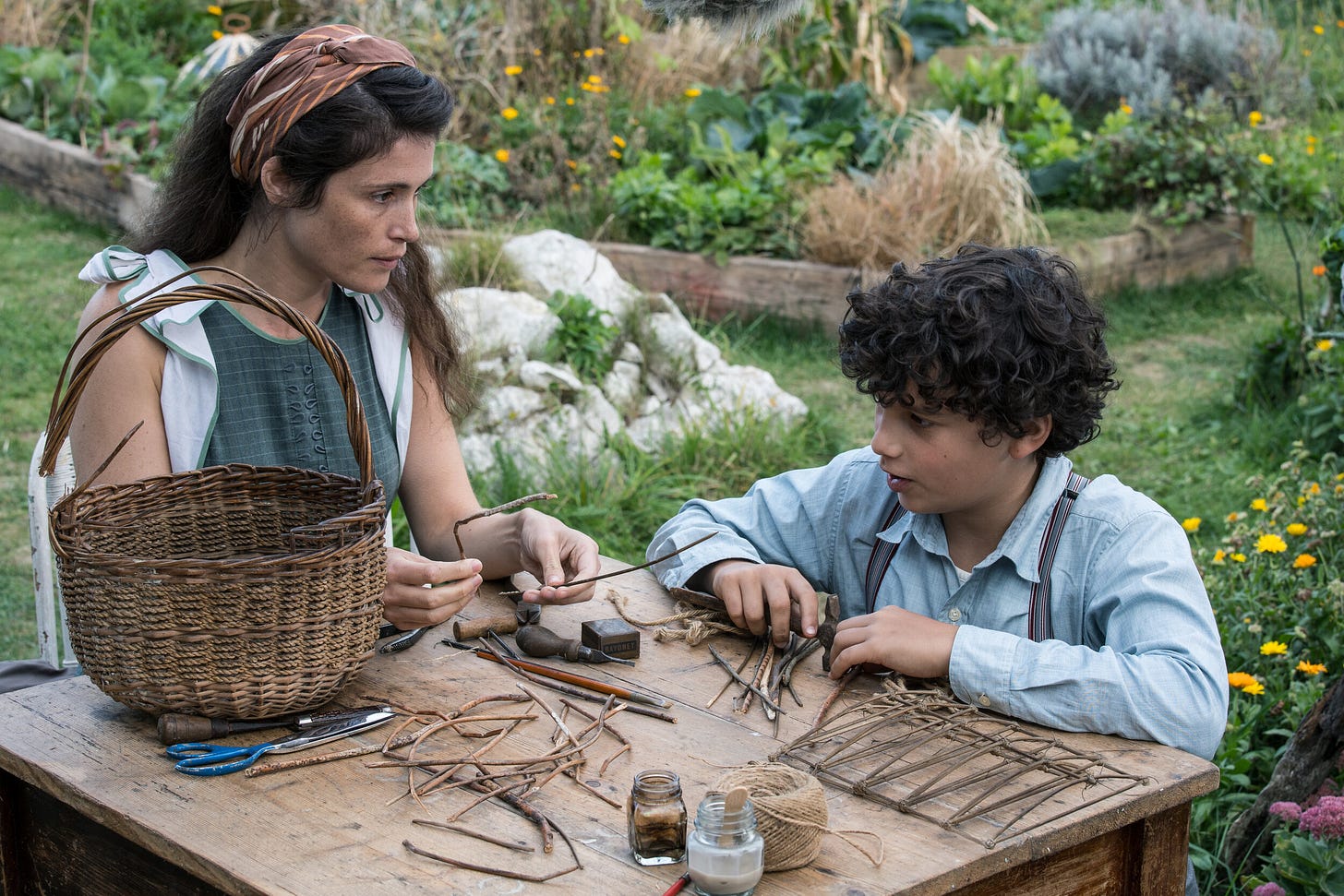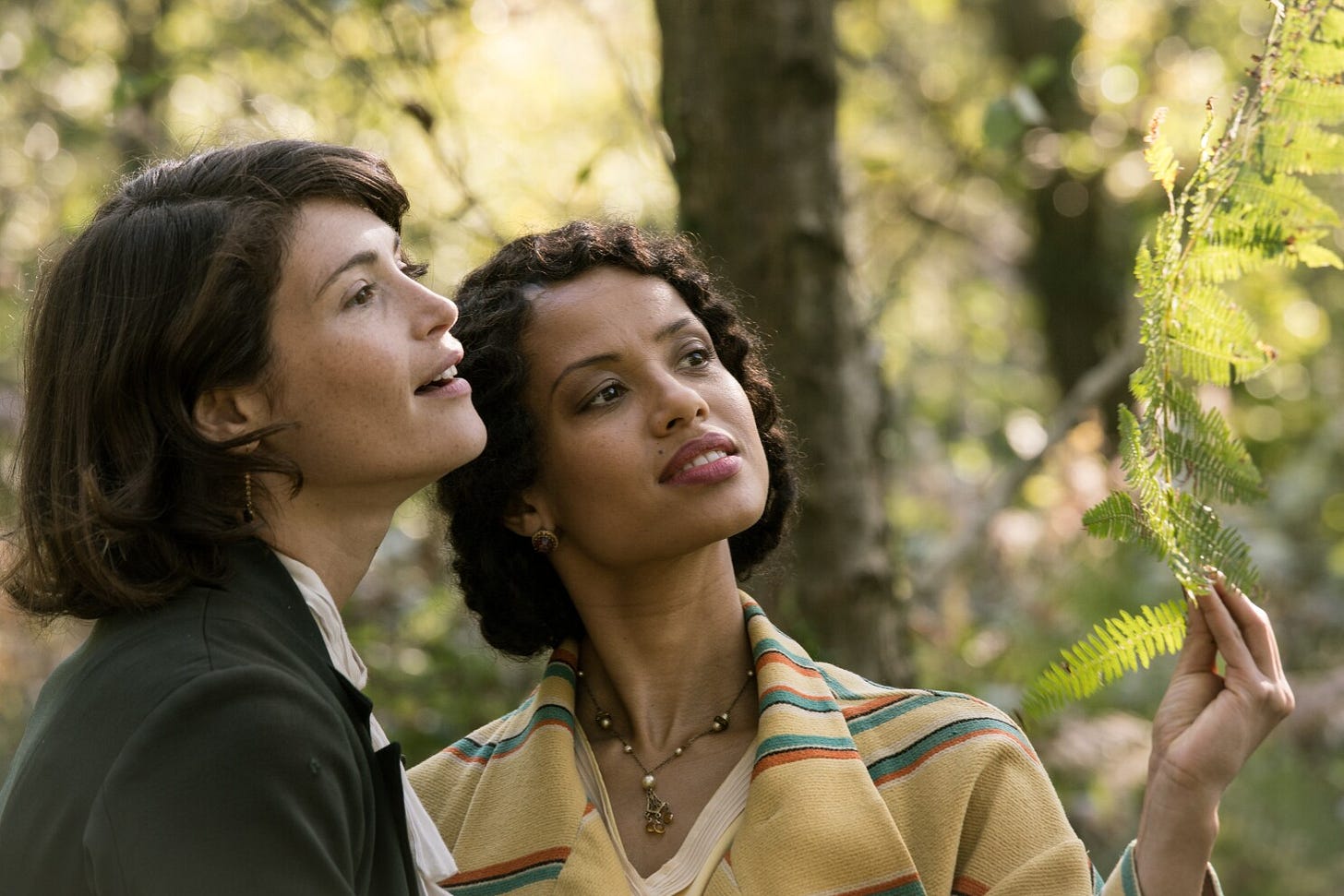Better Weather
The Subtle, Supple Delights of Jessica Swale's 'Summerland'
This piece was originally published in August 2020
Summerland is British dramatist and theater director Jessica Swale’s film directorial debut. It tells the story of Alice Lamb (Gemma Arterton), a misanthropic young folklorist who is forced to care for a child evacuated from London in advance of the Nazi blitz. The film opens and closes on the great Dame Penelope Wilton as older Alice in the 1970s, and flashes of the character’s memories of being an Oxford girl in the ‘20s run through the middle, but Summerland is primarily a sort of wartime conversion narrative. Alice’s nature, scarred over by love lost and gone bitter, is gradually healed by the slow emergence of maternal love for the bright-eyed and innocent child, Frank, played with preternatural nuance by newcomer Lucas Bond.
When Frank is dropped at the doorstep of Alice’s romantically isolated cliffside cottage on the outskirts of a town in East Sussex, he finds her in a bitter and recalcitrant state. For their first dinner she hands him an uncooked potato, raw ham, and a whole egg. “You don’t expect me to cook it for you? There’s the stove,” she points, and walks back to her life’s great pursuit—her writing. She spends her days laced into a rigid routine of researching and composing “academic theses, not stories,” as she corrects a prying town elder (Tom Courtenay), that use science to debunk narrative folkloric explanations for strange natural phenomena.
Her life is solitary, studious, and mercilessly subjected to the strictest self-imposed routine. The war’s sudden imposition, via Frank, on that routine brings with it other, more upbraiding interruptions. His inadvertent puncturing of the hermetic seal on her life stirs up vivid flashbacks of a time when she was, like him, looking toward the future with innocent hope. In that time, her twenties in the ‘20s, she met Gugu Mbatha-Raw’s Vera at a spring concert at Oxford. The spark was immediate, the chemistry undeniable. So began the hushed and rapturous affair whose sudden break has cast a long, withering shadow over Alice’s life. It is out from under this burden that Frank’s childlike curiosity and unquestioning faith in the goodness of other people begins to pull Alice.
Alice’s emotional flowering begins to dovetail with the subject of her latest inquiry—the Summerland myth. In the film, what Alice calls Summerland is actually Fata Morgana, or centuries-old mariner’s yarns of floating islands materializing inexplicably on the horizon, thought of as conjurings of the wicked sorceress of Arthurian lore, Morgan Le Fay. In reality, Summerland is a term created by theosophists in the 19th century to refer to a concept similar to heaven in ancient pagan cosmologies. Swale has simply nested the one within the visual of the other. Called variously The Otherworld, The Shining Land, and the Land of the Young by Celts, Summerland is “a land of eternal summer, with grassy fields and sweet flowing rivers,” like “Earth before the advent of humans,” writes popular witchsplainer Scott Cunningham. He could well be describing the pastoral, soft and sunlit setting of Swale’s film—the southeast English coast, shot gloriously on location.
If it’s possible to resist Summerland’s principal hook, namely, Swale’s ability to tell an intricately plotted, politically engaged, at times bleak story in a way that feels as sublime, escapist, and low stakes as the folklore its heroine is investigating, then the locations which provide backdrop for it all prove irresistible. It’s simply impossible to look at Gemma Arterton with no makeup on, hair free and flowing down her back, clad in a warm wardrobe of rustic, earth-toned skirts and cardigans, scrawling something about wildflowers in her leatherbound notebook, emblazoned against the operatic white chalk cliffs being continually washed by the sparkling sapphire sea and not feel instantly soothed, regardless of what else is going on, in her life or yours.
Landscape is then not just backdrop, it is central to the film’s most potent attribute—its palliative effect on the weary and discontented viewer’s soul. Cunningham’s evocation of Summerland, as an oasis suspended in time, above and parallel to the conflicted world, where all pain is temporarily abolished, extends beyond how the film looks to how it feels, landing at this particular moment.
Like the floating islands that give it its name, Summerland hovers above real life without ever quite touching down. In the moments the film’s dramatic conflicts threaten to break through the amniotic stasis of its sun-drenched cinematography, romantic thematic pursuits, and effervescent dialogue, Swale vanishes the stakes. Only one line is spoken about what would have been the multiply illicit nature of Arterton and Mbatha-Raw’s relationship, for instance. “They think we should burn in hell,” Alice has to explain to Frank, who in all his totemic, childlike innocence, has managed somehow to avoid homophobic social inculcation. Never mind the fact that their relationship, in addition to being same sex, was cross racial. What would it have been like for Vera, as a woman-loving Black woman, to navigate a white ethno-nationalist empire during a time when homosexuality (though lesbianism was never targeted explicitly in the laws) was punishable by exile, hard labor, and even imprisonment? We can only imagine, because that’s not Summerland’s game.
Summerland isn’t a dirge-like, finger-wagging history lesson like The Imitation Game. Nor is it bright, confectionary, period-set escapism like Autumn de Wilde’s recent adaptation of Emma. It’s somewhere in between, more akin to Jonathan Levine’s Long Shot, which embraces contemporary cultural politics without really getting into them. The result is a kind of guilt-free indulgence in classical Hollywood narrative constructs, made possible not by inverting or deconstructing them, but by simply updating who gets to negotiate their terms. This sounds like criticism but I for one am fully on board. Long Shot was one of my favorite movies of last year, and Summerland is one of my favorite movies this year so far. There is a place for escapism with an ethical backbone. More than ever, we need to be able to relax under the spell of fantasists we can trust not to poison us with irony or distort history to suit their ideology. Spoiler alert, but Summerland has a happy ending. Would you expect that from a period film with an interracial lesbian couple at its center? You wouldn’t, but wouldn’t you like to?





